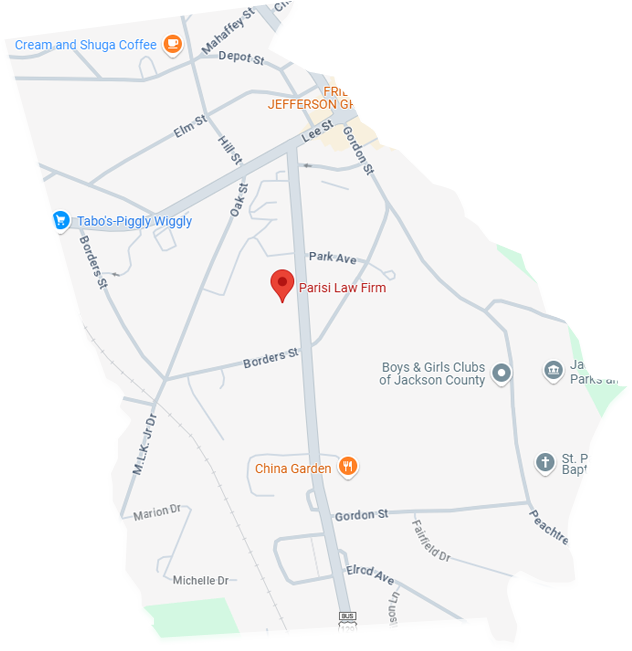
Who Pays for My Car Accident Medical Bills?
If you have been injured in a car accident for the first time, you’re probably asking yourself: “Who’s responsible for paying my car accident medical bills?”After sustaining injuries in a car accident in Jefferson, GA, due to the fault of another driver, the at-fault insurance company generally will not pay your bills as they accrue. Instead, they wait until you are finished treatment for your injuries, then your lawyer will send a demand package to the at-fault car insurance company detailing your injuries, medical treatment, and medical bills, among other things, and demand a certain amount of money to cover those damages.
Determining the At-Fault Party in a Car Accident
Georgia is an at-fault state. That means that the party liable for causing a car accident will be the one to compensate the other driver for their bodily injuries and/or property damage. The at-fault driver’s insurance company is supposed to cover the medical expenses, car repair and replacement costs, lost income, and other damages sustained by the accident victim. Nonetheless, the injured party must prove negligence by the at-fault driver.
Depending on the circumstances and nature of the car accident, various parties may be held liable for a crash. Below are possible at-fault parties and the scenarios in which they are held responsible:
- The car driver – Every driver owes a “Duty of Care” to other motorists. A car driver is at-fault for causing an accident when their recklessness or negligence led to the crash. For instance:
- Following too closely
- Running a red light
- Failure to yield right of way
- Texting while driving
- Failure to yield while turning left
- Employer – If the at-fault driver was working in the course and scope of their employment at the time they caused the accident, their employer may be held liable for the damages.
- Government – If the at-fault driver is a government employee and was acting within the bounds of their employment during an accident, the government agency may be held responsible, although the government may be protected by sovereign immunity. The government is also required to perform road maintenance. The transport department may be to blame if the accident occurred due to a pothole, poor signage, missing guardrails, etc.
You Might be Partly at Fault in a Car Accident in Georgia
Georgia follows the rule of modified comparative negligence when determining the at-fault party in a car accident. That’s when the court evaluates the incident and finds that both parties share blame for the accident.
The good news is: you can still file a claim and get compensated even if you’re partially at fault. Georgia law states that so long as you contributed less than 50% to the accident, you can receive compensation. Still, the court will reduce the settlement amount you receive by the percentage of fault you contributed.
For example, if you were 20% at fault, you’ll only be entitled to recover 80% of your damages. However, if the fault is shared 50-50, you won’t recover any amount.
So, Who Pays My Car Accident Medical Bills?
In short, you will be the one to pay for the upfront medical costs. Once you’ve reached full recovery, you’ll submit the medical bills to the at-fault driver’s insurance company for review to receive compensation for your injuries, property damage, and pain and suffering. Often, the insurance company will try to shift the blame to you to avoid paying the settlement. However, with a personal injury attorney on your side, the insurance company is much more likely to offer full value for your case.
You have three options to clear your medical bills when getting treatment before the settlement of your auto accident lawsuit. These include:
- Private or government-sponsored medical insurance
- Car insurance injury coverage
- Medical bill coverage on a lawyer’s lien
If you have private or group health coverage or any form of government health insurance, such as Medicare, Medicaid, or Tricare, these medical insurance plans may be used to pay for your treatment immediately after sustaining injuries from a car accident. You will need to pay your copays and deductibles out of pocket. Also, you may have to reimburse your health insurance company from the proceeds of the car accident settlement.
Georgia law provides that the at-fault party and their liability insurance carrier should be held accountable and fully compensates you for the medical costs you incur regardless of whether such expenses are fully “out of pocket.” As a matter of fact, evidence of payment by health insurance agencies (also referred to as a “collateral” source of payment) is not admissible evidence in a personal injury lawsuit.
Car Insurance Medical Payments for Auto Accident Injury
Some drivers add medical payment or Med Pay coverage to their auto insurance policies. This type of coverage guarantees that their car insurance provider will cover some of their car accident medical bills. This coverage will cater to any medical expenses for the injuries you sustained in a car crash up to the policy’s limit. The advantage is that it doesn’t have a deductible. That means once your healthcare expenses exceed the limit, the responsibility for the medical costs is shouldered by the victim or their personal healthcare insurance.
Med Pay is not usually included when you’re buying car insurance. It would be best first to check your policy’s “Declarations or Coverages Page” to confirm whether your insurance package includes Med Pay coverage. It actually helps to add Medical Payment to your car insurance as the proceeds can offset a high deductible health insurance policy or cover health insurance co-payment.
I Have No Health Coverage: How Can I Cover My Medical Bills?
If you don’t have any health insurance coverage or Med Pay coverage in your auto insurance and cannot also afford an out-of-the-pocket payment, your next option would be to treat under an “attorney lien.” In that case, your personal injury lawyer will sign a declaration with a doctor to provide treatment against any future compensatory amount you receive following a personal injury claim.
Additionally, under Georgia Law O.C.G.A. § 44-14-470 (b), hospitals, physician practices, nursing homes, and traumatic burn care centers may offer liens for reasonable charges for treating an injured person. That implies you can obtain medical liens in hospitals, as well as other medical care facilities. Nonetheless, the statute does not protect against emergency medical services (EMS).
When treating a non-insured auto accident victim, the healthcare facility will often request that the victim sign a lien letter. That gives the doctor or practice to recover any medical costs due to the victim’s injuries from the proceeds of their car accident lawsuit.
If you have been injured in a car accident and are worried about how you will cover your medical expenses, contact us right away for a free case review.



